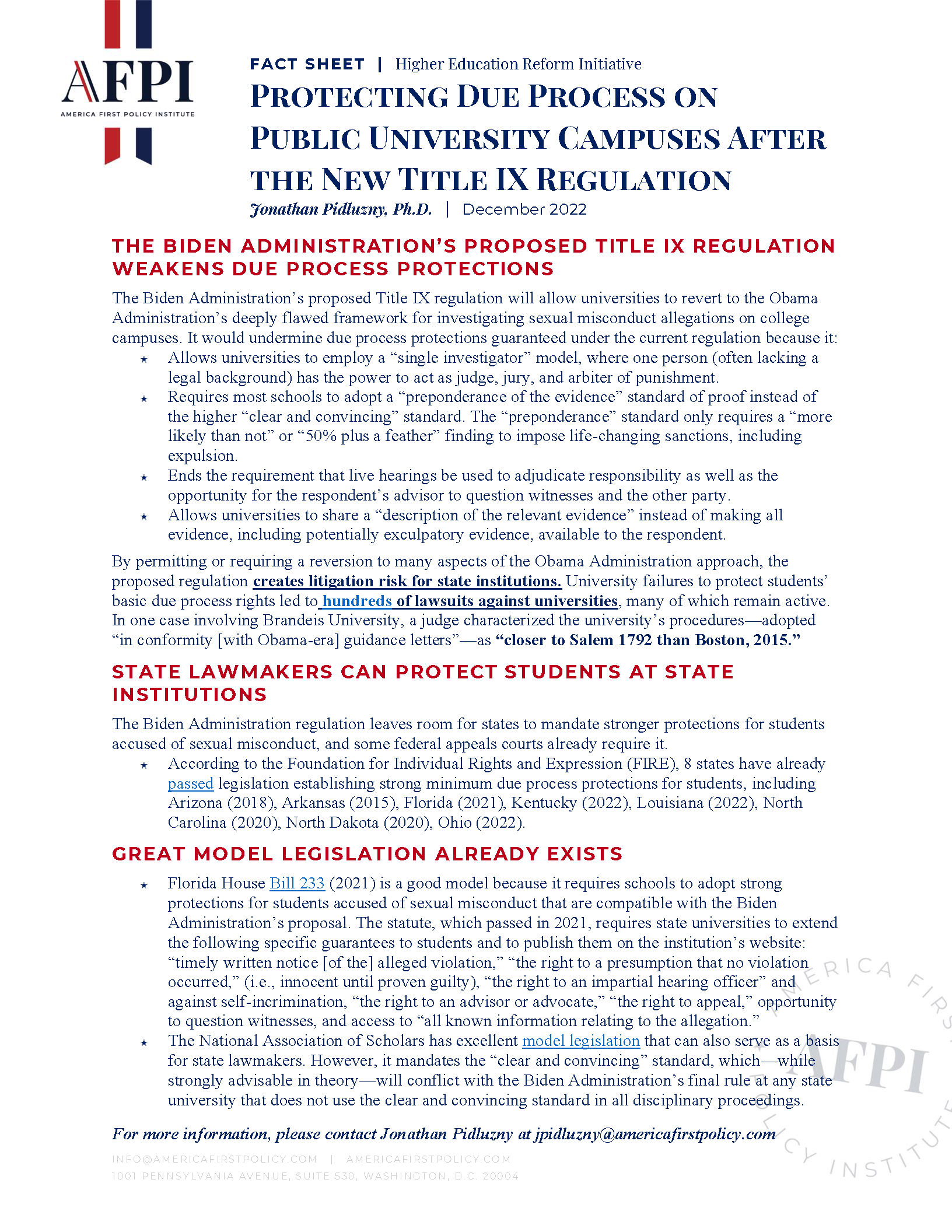Protecting Due Process on Public University Campuses After the New Title IX Regulation
The biden administration’s proposed title IX regulation weakens due process protections
The Biden Administration’s proposed Title IX regulation will allow universities to revert to the Obama Administration’s deeply flawed framework for investigating sexual misconduct allegations on college campuses. It would undermine due process protections guaranteed under the current regulation because it:
- Allows universities to employ a “single investigator” model, where one person (often lacking a legal background) has the power to act as judge, jury, and arbiter of punishment.
- Requires most schools to adopt a “preponderance of the evidence” standard of proof instead of the higher “clear and convincing” standard. The “preponderance” standard only requires a “more likely than not” or “50% plus a feather” finding to impose life-changing sanctions, including expulsion.
- Ends the requirement that live hearings be used to adjudicate responsibility as well as the opportunity for the respondent’s advisor to question witnesses and the other party.
- Allows universities to share a “description of the relevant evidence” instead of making all evidence, including potentially exculpatory evidence, available to the respondent.
By permitting or requiring a reversion to many aspects of the Obama Administration approach, the proposed regulation creates litigation risk for state institutions. University failures to protect students’ basic due process rights led to hundreds of lawsuits against universities, many of which remain active. In one case involving Brandeis University, a judge characterized the university’s procedures—adopted “in conformity [with Obama-era] guidance letters”—as “closer to Salem 1792 than Boston, 2015.”
state lawmakers can protect students at state institutions
The Biden Administration regulation leaves room for states to mandate stronger protections for students accused of sexual misconduct, and some federal appeals courts already require it.
- According to the Foundation for Individual Rights and Expression (FIRE), 8 states have already passed legislation establishing strong minimum due process protections for students, including Arizona (2018), Arkansas (2015), Florida (2021), Kentucky (2022), Louisiana (2022), North Carolina (2020), North Dakota (2020), Ohio (2022).
Great model legislation already existS
- Florida House Bill 233 (2021) is a good model because it requires schools to adopt strong protections for students accused of sexual misconduct that are compatible with the Biden Administration’s proposal. The statute, which passed in 2021, requires state universities to extend the following specific guarantees to students and to publish them on the institution’s website: “timely written notice [of the] alleged violation,” “the right to a presumption that no violation occurred,” (i.e., innocent until proven guilty), “the right to an impartial hearing officer” and against self-incrimination, “the right to an advisor or advocate,” “the right to appeal,” opportunity to question witnesses, and access to “all known information relating to the allegation.”
- The National Association of Scholars has excellent model legislation that can also serve as a basis for state lawmakers. However, it mandates the “clear and convincing” standard, which—while strongly advisable in theory—will conflict with the Biden Administration’s final rule at any state university that does not use the clear and convincing standard in all disciplinary proceedings.
For more information, please contact Jonathan Pidluzny at [email protected]
